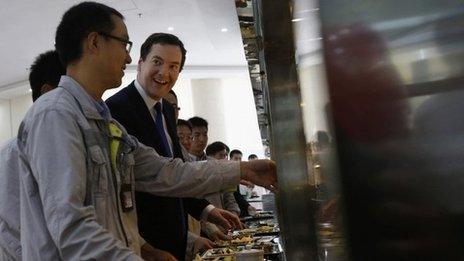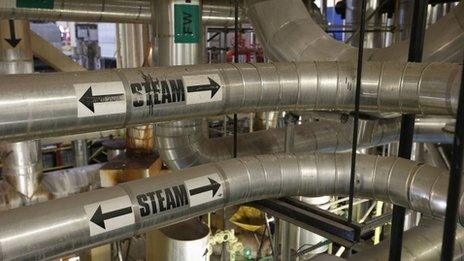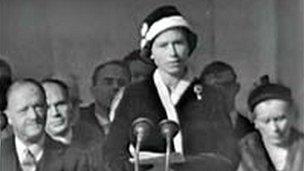Is it a good idea to allow China a stake in UK nuclear?
- Published

The UK is to allow Chinese companies to take a stake in British nuclear power plants. Is this a good idea?
It is 57 years to the day, external since the Queen threw a lever to start electricity flowing from the world's first civil nuclear power plant, at Calder Hall, in Cumbria.
If you had told any of the dignitaries present that day that Britain would one day surrender control of its nuclear industry to foreign powers, losing in the process the ability to build its own reactors, they would have thought you were mad.
But we have long got used to the idea that Britain is no longer an industrial powerhouse.
So why should we be concerned that China, a former Cold War enemy, has been given the go-ahead to invest in new nuclear plants?
The economics are simple enough.
The government believes it needs new nuclear power plants to keep the lights on. But it has ruled out public subsidies, so badly needs private investment.
"We need to see investment not just from China but from Japan, the US, France and the City of London," said Energy Secretary Ed Davey, an architect of the deal between French energy giant EDF and China General Nuclear Power Group.
'Inexplicable'
The deal is initially confined to a 30% stake in a single new plant, at Hinckley Point, which will be built using French and Japanese technology. But it could lead to Chinese companies taking majority stakes in future projects, and will see Chinese technicians being trained by British nuclear scientists.
It is being hailed by Chancellor George Osborne as a triumph of British diplomacy, potentially opening up China's rapidly expanding nuclear energy market to British companies and keeping energy bills down for British consumers.
But not everyone is quite so ecstatic.
"With continuing concerns about Chinese cyber-attacks on foreign governments' computer systems, should we really be inviting companies which many believe to be effectively arms of the Chinese government into our critical infrastructure at all?," writes Stuart Nathan, in trade magazine The Engineer, external, calling the deal "inexplicable".
In a recent Financial Times blog, external, former Downing Street energy policy adviser Nick Butler summed up the concerns: "They will be inside the system, with access to the intricate architecture of the UK's National Grid and the processes through which electricity supply is controlled, as well as to the UK's nuclear technology."
Lord West, cyber security minister in the previous Labour government, has been vocal about the threat posed by China to Britain's computer networks - something always denied by the Chinese government.
"China has an army of people hacking into our systems. They are engaged in industrial espionage on a massive scale," Lord West told BBC News.
He is particularly concerned about the deal between BT and Huawei, which gives the Chinese telecoms giant access to Britain's telecommunications network, as highlighted earlier this year in a highly critical report by the intelligence and security committee., external
Human rights
But the former Home Office minister says he is relatively relaxed about a Chinese company taking a stake in Britain's nuclear industry, beyond the "embarrassment" of living in a country that is no longer capable of building its own reactors.
"We probably don't have to worry too much, as long as we have a separate and free state with a Parliament that retains control," he says.

Hinckley Point will be the site of the first Chinese investment
It is not as if China is a rogue state or about to go to war with Britain, although, he adds, things could change.
"In 50 years time you never know what will happen. If someone knows your critical infrastructure very well they can do damage to it."
There are also concerns about China's human rights record, which does not seem to have been mentioned by Chancellor George Osborne in his meeting with Chinese officials, despite a new Foreign Office 'action plan' urging firms to pay more attention to the issue., external
"It could set a dangerous precedent," says an Amnesty International spokesman, "If other countries see Britain doing business with China without mentioning human rights then they will follow suit."
The key question for many, however, is why can't Britain, the country that pioneered civil nuclear energy, build its own reactors?
The UK is uniquely relaxed among Western nations about foreign ownership of key national assets like nuclear power plants, says Antony Froggatt, lead author of the annual World Nuclear Industry Status Report., external
'Risky investment'
In the US, Australia and Canada foreign companies are prevented by law from owning critical infrastructure. EDF was recently blocked from building a third reactor at the Calvert Cliffs nuclear plant, in Maryland, due to America's ban on foreign ownership.
In some European nations, state-backed "national champions", such as EDF, dominate the nuclear market, while in others, such as Germany, the industry is being wound down.

The Queen opened Calder Hall in October 1956
British companies will be involved in building new nuclear plants, says Mr Froggatt, and there is nothing to stop the government breathing new life into Britain's own nuclear industry, which once led the world.
But nuclear is a "very risky" investment without massive public subsidies, due to the long lifespan of the plants, and even mighty state-backed enterprises now like to spread the risk by seeking partners.
It is also an increasingly niche business.
At the nuclear industry's peak in 1979, there were 234 plants under construction around the world. Now there are just 66 - 28 of which are in China.
"If you were to build up a new industry you would be better doing it in other fields," says Mr Froggatt.
But he adds: "I hope that the government, by encouraging this Chinese investment isn't promising that Chinese reactors will be built in the UK because it hasn't got the power to do that."
The current design of Chinese reactors would be unlikely to meet British safety standards.
But experts say the real prize for the Chinese is to gain approval from the UK nuclear industry regulator, known as one of the toughest in the world, for a new generation of designs, which could open the door to Western markets.
Mr Froggatt is also concerned that the political consensus in the UK, with all three main parties now firmly behind nuclear energy, has prevented tough questions being asked about the wisdom of the current policy.
Deputy Prime Minister Nick Clegg, quizzed about the China deal on his weekly LBC radio show, summed up the government's laissez fare approach.
"If people want to come here and build safe sustainable low-carbon ways of generating energy without dollops of British taxpayers' subsidy in a way which is entirely regulated by us, where the rules are set up by us, not in Beijing, then of course that's something we should be open to.
"Because we've got to keep the lights on and we've got to protect the environment."
- Published17 October 2013
- Published17 October 2013